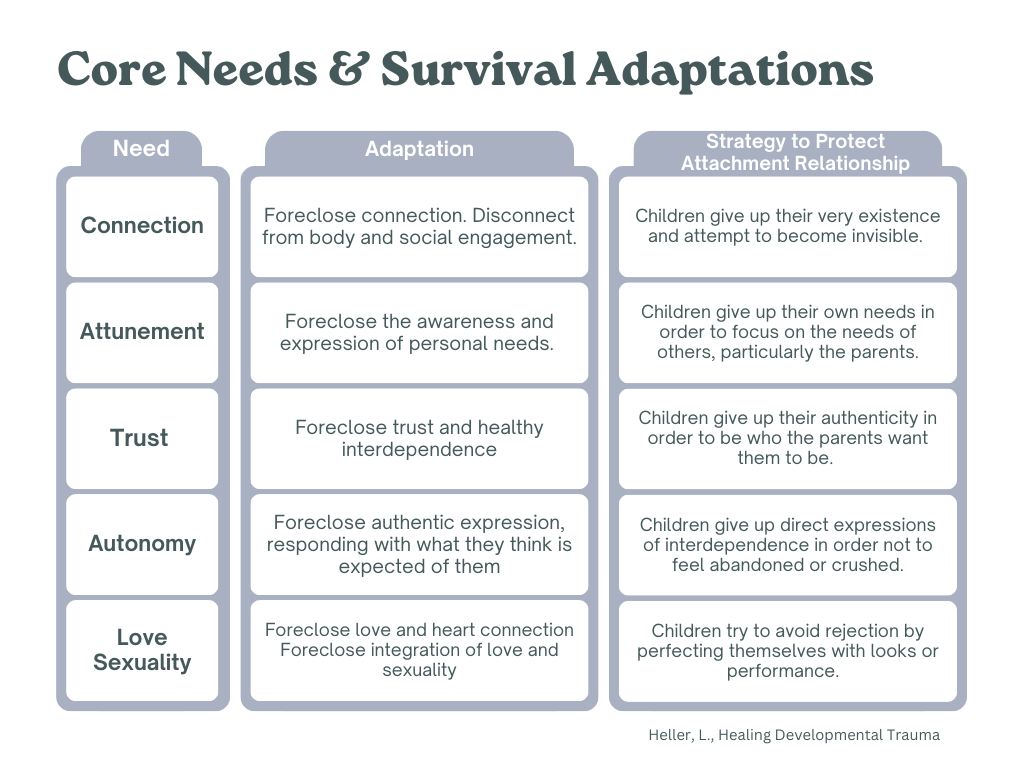Strategies of Survival
Why do we disconnect from ourself in the first place?
In short, children will always make themselves “bad” in order to maintain a sense of safety and view their caregivers as “good”. Consider these charts describing core developmental needs and the corresponding survival strategies and identifications that develop when those needs are not consistently met or respected by the environment. As children see themselves as responsible for their experiences, they internalize a sense of self based on those experiences for better or for worse.
When there is environmental failure (anything less than nourishing of the need), children disconnect from their own reality, body, emotions, and heart in order to prioritize the connection to their caregiver and disconnect from overwhelming levels of physiological and emotional arousal. This lays down brain and body based patterns of shame identifications (as well as their pride-based counter parts).
As young people, we rely solely on our caretakers to meet our basic physical and emotional life needs. Ideally, our caregivers meet these needs in ways that reinforce basic trust that it is safe to connect to our bodies, needs, others, and life itself. Though parents undoubtedly try their best with the tools they have, sometimes one or more of these needs is not able to be met. Perhaps a parent never had their own needs met in this way and may lack the ability to soothe their child effectively or to have the sense of self necessary to allow their child to experiment with autonomy and independence. When children experience repeated misattunement of these core needs, they cope by personalizing the failures. Simply put, It is safer for a child to disconnect from their own goodness, rights, and needs than to risk loss of the attachment relationship. Naturally, these patterns of disconnection become reinforced overtime, impacting true belonging and intimacy in interpersonal relationships. This pattern of affect dysregulation, negative self-concept, and difficulty in interpersonal relationships describe the diagnostic criteria for what most countries recognize as Complex-Post Traumatic Stress Disorder (C-PTSD).
When humans are required to reject their own authenticity and aliveness in order to survive, they learn to play into the expectations, reflections, and needs of the environment. These tendencies are internalized as one’s sense of identity and self-concept to the degree that humans often mistake them for their “authentic” personality. In the NARM (Neuro-Affective Relational Model), these habitual ways of relating are called “survival strategies”. It is important to remember that though these strategies are often what are now keeping adults stuck in unfulfilling patterns, they were once savvy, heroic, and life saving.
So do we “get rid” of these strategies to heal?
No way! If self-rejection helped us to reconnect to our authentic self then most of us wouldn't need therapy. It is this very self-disconnection from ourself that once life-saving, is now leading to challenging symptoms and internal disorganization. Though most people will try in one way or another to eradicate the parts of themselves causing pain, it is actually developing a different relationship to the strategies that allows us gradual freedom from identifying as them. Almost all of these strategies can be assets at times, so we aren’t trying to eliminate them in any way. You can think of it more as learning to direct the strategies when YOU want to, rather than these strategies directing you and your life.
If I’m not just these strategies than what or who am I?
That’s what we get to explore and discover together. Disconnecting from our emotions turns us into objects. We learn to hustle for love by offering these strategies in place of true intimacy and belonging. Healing from this self-objectification means relearning an entirely new way of relating to ourselves. Your unique essence and authenticity will be something you come to recognize more deeply as you reconnect to your body, emotions, and core capacities for authentic intimacy and aliveness.
“Being good will never solve the problem because the problem is not that I am bad.”
-CLEMENTINE MORRIGAN



